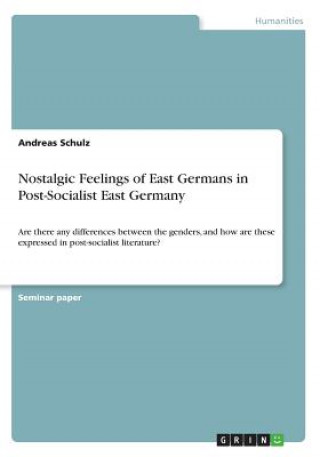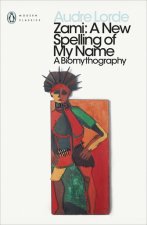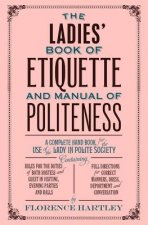
Kod: 13798507
Nostalgic Feelings of East Germans in Post-Socialist East Germany
Autor Andreas Schulz
Seminar paper from the year 2016 in the subject Cultural Studies - European Studies, University of Vienna (Kultur und Sozialanthropologie), course: Whither Post-Socialism - Any News from the Former Socialist World?, language: Engl ... więcej
- Język:
 Angielski
Angielski - Oprawa: Miękka
- Liczba stron: 20
Wydawca: Grin Publishing, 2016
- Więcej informacji o książce

Zobacz książki o podobnej tematyce
Bon podarunkowy: Radość gwarantowana
- Podaruj bon o dowolnej wartości, a my się zajmiemy resztą.
- Bon podarunkowy dotyczy całej naszej oferty.
- Możesz wydrukować elektroniczny bon z e-maila a następnie przekazać go obdarowanemu.
- Ważność bonu wynosi 12 miesięcy od daty wystawienia.
Więcej informacji o Nostalgic Feelings of East Germans in Post-Socialist East Germany
Za ten zakup dostaniesz 102 punkty
 Opis
Opis
Seminar paper from the year 2016 in the subject Cultural Studies - European Studies, University of Vienna (Kultur und Sozialanthropologie), course: Whither Post-Socialism - Any News from the Former Socialist World?, language: English, abstract: In the following chapters I will introduce basic conceptual frameworks of nostalgia as a human method to handling time. After conceptualizing the nostalgia framework I will discuss labor and living conditions of females before and after the fall of the iron curtain and I will explain why there could be a gender gap in nostalgic feelings and what functions these expression of nostalgic behavior could have on men and women. A conclusion will sum up the main points of the discussion. The phenomenon of nostalgia (in all its patterns) is not limited or confined to the former socialist world. But it is especially crucial for these countries which can be labeled as a former post-communist/socialist country in observing complexity and multi-rootedness of the phenomenon of nostalgia like in East Germany. The dimensions and the functions of nostalgia itself are variable in the specific contexts of history-making and its dealings with time in order with future politics. It has for instance different function if we compare the role of it even in different post-socialist countries like East-Germany and Mongolia. But not just the functions, also the dimensions can differ from context to context. I would like to distinguish between several categories like the differences of nostalgia in gender, race and class perceptions. Although, the equality of genders and gendered work was proposed in socialist countries, the concept intersectionality builds a useful analytic frame within the discussions of nostalgia - even in the context of socialist settings. Because of the historical marginalization and boundaries in granting typical female work, the segregation of foreign contract workers as well as the social inequalities between elites and workers (even if the income gap is not that serious comparable to neo-liberal societies, but the political influence and privileges were crucial) makes the concept of intersectionality even more meaningful. In the context of post-socialist settings I would like to focus on one of these analytic units - the aspect of gender and the perception of nostalgia (as a tool to handling the present in focusing in the future by referring to an (imagined) past). Gender is a crucial category for the understanding and explaining post socialist changes. I would like to illustrate within the context of socialist Germany how gender differences arise, how the differences in the perception of the past are and how the functions of nostalgia differ.
 Szczegóły książki
Szczegóły książki
Kategoria Książki po angielsku Society & social sciences Society & culture: general Social groups
174.58 zł
- Pełny tytuł: Nostalgic Feelings of East Germans in Post-Socialist East Germany
- Podtytuł: Are there any differences between the genders, and how are these expressed in post-socialist literature?
- Autor: Andreas Schulz
- Język:
 Angielski
Angielski - Oprawa: Miękka
- Liczba stron: 20
- EAN: 9783656987307
- ISBN: 3656987300
- ID: 13798507
- Wydawca: Grin Publishing
- Waga: 54 g
- Wymiary: 254 × 178 × 1 mm
- Data wydania: 08. August 2016
Ulubione w innej kategorii
-

Women Who Run with the Wolves
43.19 zł -15 % -

Freedom Writers Diary
62.63 zł -15 % -

Think Like a Monk
50.20 zł -26 % -

Orientalism
52.11 zł -15 % -

How Europe Underdeveloped Africa
83.18 zł -9 % -

Desert Flower
48.70 zł -14 % -

Why Does He Do That?
69.84 zł -14 % -

Letters to a Young Muslim
51.60 zł -23 % -

Eros and Mysteries of Love
85.08 zł -4 % -

Life After Darkness
111.04 zł -10 % -

Puer Tea
184.10 zł -

Womanhood
92.70 zł -23 % -

Complete Book of Pilates for Men
79.07 zł -23 % -

JFK - 9/11
138.20 zł -

Colloquial Yiddish
287.23 zł -

Gypsy Identities 1500-2000
284.52 zł -

Sword of No-sword
118.15 zł -11 % -

Servitors of Empire
85.08 zł -4 % -

Gerotranscendence
601.82 zł -

Northwest Coast Indian Art
124.87 zł -4 % -

Qur'an
138.30 zł -23 % -

When God Was A Woman
81.27 zł -5 % -

The Mastery of Love
61.33 zł -5 % -

Vintage Menswear
73.95 zł -5 % -

Who Cooked the Last Supper?
85.38 zł -4 % -

Women Who Run With The Wolves
69.84 zł -14 % -

The Way of Men
69.34 zł -4 % -

The Autobiography of Malcolm X
45.39 zł -5 % -

Second Sex
50.20 zł -26 % -

Goddesses in Everywoman
51.60 zł -23 % -

Talking with Female Serial Killers - A chilling study of the most evil women in the world
47.09 zł -23 % -

Intellectuals and Society
114.54 zł -11 % -

Women in the Qur'an
81.97 zł -4 % -

Erotic Bondage Book
73.05 zł -4 % -

Zami
47.09 zł -23 % -

Nine Years among the Indians, 1870-1879
104.82 zł -4 % -

Dark Emu
60.82 zł -23 % -

Childhood and Society
81.07 zł -5 % -

Happy City
51.60 zł -23 % -

The Male Nude
81.97 zł -4 % -

The Bell Curve
79.07 zł -23 % -

We Should All Be Feminists
33.46 zł -23 % -

Empire of the Summer Moon
60.82 zł -23 % -

Radium Girls
47.09 zł -23 % -

Dance of Anger
47.09 zł -23 % -

Beauty Myth
60.82 zł -23 % -

Muqaddimah
105.02 zł -4 % -

TROUBLEMAKER
77.16 zł -5 % -

Ladies' Book of Etiquette and Manual of Politeness
65.03 zł -5 %
zadowolonych klientów
Od roku 2008 obsłużyliśmy wielu miłośników książek, ale dla nas każdy był tym wyjątkowym.
Copyright! ©2008-24 libristo.pl Wszelkie prawa zastrzeżonePrywatnieCookies





 21 milionów książek
21 milionów książek Dostawa 10.99 zł
Dostawa 10.99 zł (32) 444 93 66 (8-15.30h)
(32) 444 93 66 (8-15.30h)